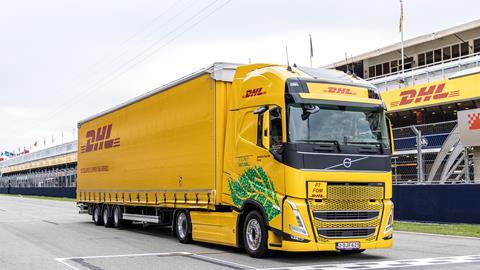DHL and Formula 1 has sealed a multi-year extension of their partnership to deliver the FIA Formula One World Championship events worldwide.
The delivery giant, which has more than 40 years of expertise in motorsports logistics, is also celebrating its 20th anniversary as Formula 1’s Official Logistics Partner, making it the sport’s longest standing Global Partner.
The partnership has seen a more sustainable era of transport and logistics ushered in in recent years, with Formula 1 looking to reach its net zero goal by 2030.
Following the introduction of biofuel-powered trucks last year during the European leg of the season, the number of trucks has more than doubled this year to a total of 37 vehicles. Each truck, on average, achieves an 83% reduction in carbon emissions compared to their diesel-driven counterpart.
Arjan Sissing, DHL Group global head of brand marketing, said; ”In addition to renewing our partnership, we are proud to be the sport’s longest-standing global partner, marking DHL’s 20th anniversary as the Official Logistics Partner of Formula 1, delivering the race between the races.
”Both companies share a strong commitment to sustainability goals and a common vision to make the sport greener and more efficient. As a pioneer in sustainable logistics, we are delighted to maintain our collaboration with Formula 1 in achieving these objectives together.”
During their 20-year partnership, Formula 1 and DHL have seen an expanded calendar evolve, which this year features 24 races. It has also been rationalised to create a better flow of races in certain regions to reduce freight distance travelled between events.
DHL said the most notable change occurred in 2019 when Formula 1 announced its net zero target, in which DHL’s multimodal logistics, incorporating road, air and sea freight, plays a key role in reducing logistics-related carbon emissions.
Jonny Haworth, Formula 1 director of commercial partnerships, said: “As our longest-standing partner, DHL has become such a crucial part of the delivery of our events, so we’re delighted to continue that successful collaboration for many more years.
”Our partnership has seen the sport transform in more ways than one, and DHL have been hugely supportive in our transition to a more sustainable sport, and this will continue to be key as we move towards 2030. As sustainable logistics continues to develop, I look forward to seeing the positive impact and innovations that come next.”
The 2024 season kicks off this week in Bahrain on 29 February, marking an exciting start to the year.
Spanning 21 countries and five continents, this season includes three tripleheaders and five doubleheaders – with Formula 1 returning to China for the first time since the coronavirus pandemic.
DHL powers the enormous logistical effort of transporting up to 1,400 tons of high-value freight to each race. This includes race cars, tires, spare parts, fuel, broadcast equipment, and marketing and hospitality equipment.
The DHL Motorsports logistics team comprises 100 specialists, with up to half of them working on-site.
A new DHL motorhome will be introduced for selected European races on the Formula 1 calendar, which will serve as the designated home base for the team.
Equipped with solar panels, charging and recycling stations, this sustainable motorhome will be transported using a biofuel-powered truck.
Paul Fowler, DHL Global Forwarding head of global motorsports logistics, said: ”In addition to the increased number of trucks running on biofuel and upcoming sustainable initiatives, it is also great to see our team prioritize eco-conscious travel, exemplified by the introduction of the new DHL motorhome.
“We are continuously exploring ways to achieve Formula 1’s net zero goal, and we are delighted to collaborate with a partner who shares our dedication to sustainability and is receptive to innovative green solutions.”
In 2017, DHL Group was the world’s first logistics company to set a net zero target for all logistics-related carbon emissions by 2050.
As part of its sustainability strategy, the group plans an additional spend of up to €7bn by 2030 to drive progress towards this goal.
The company also aims to increase the adoption of sustainable fuels, accelerate the electrification of its vehicle fleet, and construct carbon-neutral buildings.














![Head Shot Stuart Hill[2305843009247093581]](https://d2cohhpa0jt4tw.cloudfront.net/Pictures/100x67/2/0/2/17202_headshotstuarthill2305843009247093581_265826_crop.jpg)


